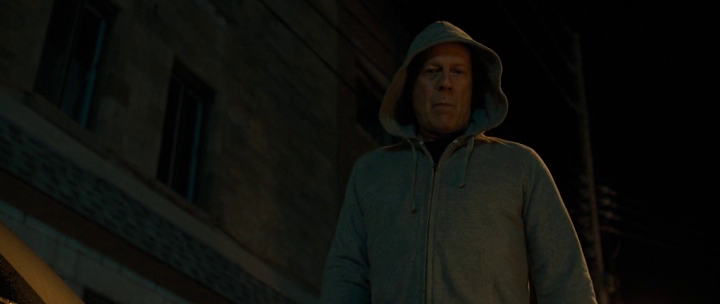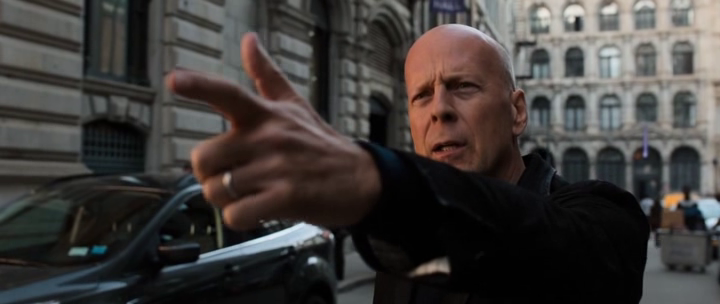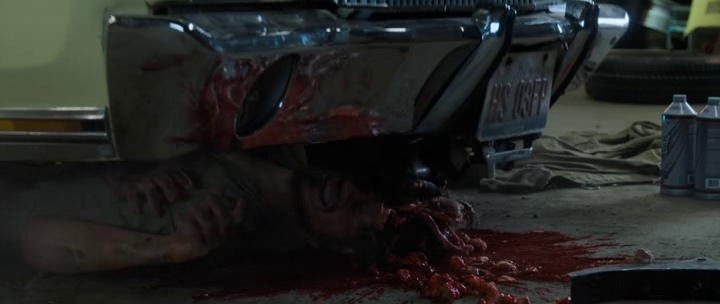The remake deals with trauma surgeon Paul Kersey (Bruce Willis) whose wife, Lucy (Elisabeth Shue) is killed during a burglary gone wrong, and while his college-bound daughter, Jordan (Camila Morrone) ends up in a coma. When police detectives Kevin Raines (Dean Norris) and Leonore Jackson (Kimberly Elise) fail to catch the perpetrators, Kersey decides that “Crime is a disease and I’m the cure,” and becomes a vigilante. Now that quote may be from Sylvester Stallone’s action film Cobra – a film about a cop going outside the law - but it’s very fitting for this movie as well because Eli Roth’s remake has a very 80s action movie vibe to it. Unfortunately for MGM and Eli Roth, the climate in the United States is not the same as it was back in the action heyday of the 80s - or even of the 70s when the original was released – as mass shootings in the real world have dampened the spirit for this kind of character.
Dressing him like the Unabomber certainly didn’t help.
Of course, guns in movies still make big box office – and the percentage of guns on movie posters to ones without is still surprisingly high – but where film’s like John Wick give audiences an over-the-top stylized action, with very little basis on reality, Death Wish aims to give us a more gritty down-to-Earth violence. Paul Kersey isn’t a top level assassin mowing down legions of killers (with an endless supply of guns and ammunition), instead, he is an average citizen who has decided that the system has failed him and thus murdering criminals is justifiable. Now this kind of revenge story is certainly nothing new to Hollywood – it’s one of the larger subgenres of the action film – but Eli Roth’s blend of the “Average man pushed too far” trope, with the extreme gore typical of his films, doesn’t quite work here. The political climate may have been a factor in the film performing poorly at the box office – grossing $34 million on a $30 million dollar production budget – but what really sank this film was its terrible script — plain and simple.In the original film, Charles Bronson played an architect who - after his wife is killed and daughter raped – takes to the streets to clean up crime, but what he doesn’t do is track down the particular guilty party. He’s not some genius investigator – able to navigate the city's underbelly – so he just stalks the streets hoping to run across random criminals. In the remake, the film does seem to be going in that direction – his first “victims” are a group of carjackers and a known drug dealer – but then as luck would have it one of his wife and daughter’s assailants shows up in the emergency room of his hospital sporting a few bullet holes of his own. Now, “luck” is the key word here, as this version of Paul Kersey has mutant level powers of luck, and one of the killers falling right into his lap is only the tip of the iceberg.
• When Kersey decides to become a vigilante, he goes to a gun store to pick up a weapon – only to learn that guns used in the commission of crimes tend to be traced back to their owners – so he goes home empty-handed. The very next scene, we see Kersey in the Emergency Room – where a gangbanger riddled with bullet holes is brought to him – and a gun falls off the gurney right at his feet. No one else in the ER hears this, so Kersey is able to kick it under the table, and thus, he now has an untraceable gun.
• After a couple random acts of vigilantism, the aforementioned assailant of his wife and daughter shows up in his ER – sporting a watch stolen from Kersey’s safe so our hero can be sure he is one of the gang – and, lucky for Kersey, the dude’s cellphone – which he finds inside the ambulance – just so happens to contain information that he can use to track down the other assailants.
• A text found on the phone leads Kersey to a bar that the gang uses to fence their ill-gotten gains, and after a ridiculous gunfight – that takes a break for Kersey to torture out a second lead to another gang member – the villain gets the drop on him, and it looks to be the end for our hero. At the last second, Kersey is saved when a falling bowling ball lands on the dude's head. And yes, this scene is as ridiculous as it sounds.
So the film started with the premise of a man – jaded by the failures of the system – deciding to prowl the streets to fight crime, but then it switches gears into the standard revenge plot of the hero tracking down the ones who wronged him – it’s kind of like Eli Roth blended the plots of Death Wish and Death Wish II – and then we get the most contrived plot elements imaginable that vary between simply unbelievable to outright laughable. Roth also throws in some of his trademark gore – a man’s head is literally exploded when Kersey drops a car on it – that are cartoonishly out of place.
Note: The “car kill” ends with the gang member stupidly asking, “You’re not going to kill me?” - while he lies trapped under a car that is being held up by an incredibly long jack – and Kersey responds, “No…Jack is.” He then yanks out the jack and the car falls, popping the dude’s head like a grape. This is the kind of one-liner you’d expect to hear Arnie to spout in one of his 80s action films. It’s as out of place here as the gore.
These types of films rely on the audience putting themselves in the place of the hero – getting to viscerally live out dreams of being a badass – but Eli Roths’ film is neither that kind of action movie, nor is it a social political commentary, as it doesn't seem to have any kind of message other than "Don't cross Bruce Willis." What we did get was a movie that was tonally all over the map – with a plot that strains credulity to the breaking point – resulting in a remake that is all too forgettable. The only positive thing I can say about this movie is that at least we won’t be seeing a remake of Death Wish: Crackdown.





No comments:
Post a Comment